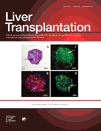Reply
We thank de Vocht1 for his interesting comments on our work.1 First, he recapitulates some limitations of the study, and second, he recommends an “epistemological more modest” approach to the conclusion that “religiosity is associated with prolonged survival in patients undergoing liver transplantation.”
The limitations are clearly acknowledged in our article,1 and some of them, as de Vocht notes, are unavoidable. There is indeed a selection bias because there were 18 nonresponders to our questionnaire. This is specified in the article. The limited sample size does not allow a sound statistical comparison between responders and nonresponders, although the 2 groups were not different with respect to age, gender, or other demographic features. Lifestyle habits and social support data were not measured, and certainly no insight into underlying biological mechanisms was obtained in the study. The occupation was assessed with a crude classification (manager: yes/no). Therefore, de Vocht is right: the study has some limitations, and it raises more questions than answers. This is unavoidable and is not necessarily a negative thing. The complexity of the issue, the required multidisciplinary approach, and the frailty of these patients do not allow an approach that is too complex or comprehensive. As for the “epistemological more modest” approach, throughout the article, we describe the association and never the causality between religious traits and prognosis. This is written in the article and has been reported in the mainstream media (from Osservatore Romano to Corriere della Sera and from the Sun to the Boston Globe), which extensively covered the article. I do not believe that the media interest was due to our understatement of the study limitations or to the (incorrect) subliminal message of a “causative” relationship between religiosity and better prognosis. Five centuries ago, a famous Florentine, Cosimo De'Medici, recommended that “you cannot govern a state with paternoster,” a classic Catholic prayer. We do agree that “you cannot treat liver transplant patients with paternoster.” However, as a physician, a psychologist, and a researcher, you certainly can try to understand the complexity of the factors modulating the prognosis of diseased patients, and these include the dimensions of personality and spirituality.
REFERENCES
Franco Bonaguidi D. Psych.*, * Institute of Clinical Physiology, National Research Council, Pisa, Italy.




